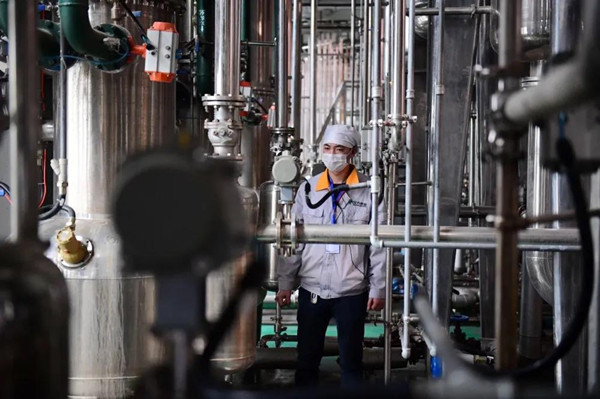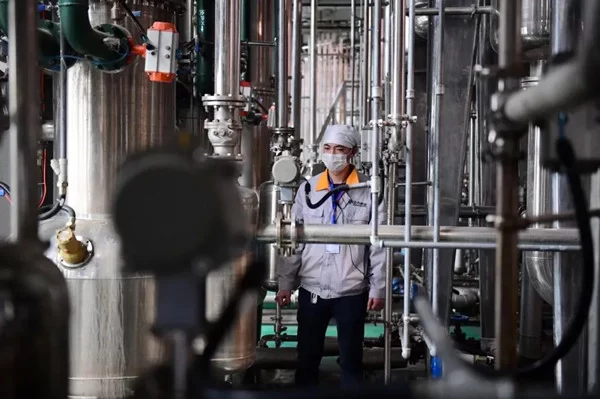GUIYANG, China, Aug. 7, 2020 — At Guizhou Xingdaxing Building Material Co., Ltd., a worker was controlling three production lines through a big data platform."Today we have produced 939.38 cubic meters, and 0.48 cubic meters are left," he told the journalist of Huanqiu.com.
This system the staff operates is called High-Performance Concrete Smart Manufacturing Big Data Cloud Platform, which demonstrates how Guiyang leverages big data to develop industries.
Guiyang, a previously less developed city in Southwest China, has been known for the application of big data to a great variety of sectors in recent years. As China’s "Big Data Valley", how Guiyang utilizes big data in industries? The journalist of Huanqiu.com interviewed several players in local industries.
As the administrative director of Xingdaxing, Li Fuhui told Huanqiu.com, "launched in 2018, this big data system has become the first high-performance concrete big data project in China. Thanks to the platform, big data has been integrated into all aspects of enterprise production and management. We can monitor and track the whole production cycle, including ordering, manufacturing and delivering."
The corporation currently gains unprecedented visibility into its operations. On this basis, Xingdaxing can immediately spot a market trend and accordingly optimize the value chain, thus maximizing the profit and minimizing the costs.
Li said to Huanqiu.com, "Our production efficiency has increased by 10 percent. Moreover, transaction costs, management costs and product development costs have separately reduced by 40 percent, 50 percent and 40 percent."
It notes that Xingdaxing has advocated the intersection of big data with traditional building material industry. The company derives insight from data-driven solutions to boost productivity and profitability.
In addition to the building material industry, big data solutions can also be employed in the pharmaceutical industry to improve product quality and production efficiency. Guizhou Hanfang Pharmaceutical Co., Ltd. is a case in point.
As director of the Hanfang Pharmaceutical Technology Innovation Center, Zhang Shilin was sitting in the extraction workshop, where a large screen displays the real-time process flow, production parameters and the temperature.
Through automatic detection equipment such as temperature control probes and sensors, the workers can monitor and operate the production line in real time.
He pointed to the screen and told Huanqiu.com, "You can imagine how hard it is to control a two-storey high medicine extraction tank with a storage capacity of six tons. But thanks to the data-driven system, the pharmaceutical temperature range can be accurately controlled within two degrees Celsius, guaranteeing the quality of the medicine."
Furthermore, armed with big data, the workers can save time costs to a large extent. According to Zhang, in the past, it required a great number of manual efforts to submit applications and get instructions.
By comparison, Hanfang has built a data warehouse that gathers information in the production, sales, marketing, testing, management and other links of the entire industry chain.

Guizhou Hanfang Pharmaceutical Co., Ltd. has built a data warehouse that gathers information in the entire industry chain.
In order to complete the production process, the staff currently just need to log in to the production management system, enter the necessary information. Therefore, the manufacturing operation can be simplified to a great extent, which facilitates efficiency.
It can be seen that the big data solution replaces the previous manual method, hence effectively improving the product quality and production efficiency.
In fact, the successful utilization of big data in local industries is inseparable from government support. As China’s Big Data Valley, Guiyang has accelerated the advancement of smart manufacturing and promoted the intersection of industries with big data in recent years.
In 2019, the local government completed 25 bench-marking projects and 308 demonstration projects for big data, and 7 provincial smart manufacturing pilot projects. Major equipment manufacturing projects include Evergrande new energy vehicles, BYD smart manufacturing and Guiyang Geely engines.
According to the municipal government, in the future, Guiyang will continue the in-depth integration of big data with local industries.
On one hand, the government will cultivate new industries, strengthen the real economy and adhere to supply-side structural reform. In 2020, it plans to introduce more than 120 emerging industrial projects, ensuring the output value of new industries accounts for over 20 percent of the total industrial output value.
On the other hand, Guiyang will take advantage of big data to transform and upgrade traditional industries. In 2020, the local government will implement an internal network transformation of more than 50 industrial enterprises, organize over 20 key service providers to build industrial Internet service resource pools.
Photo – https://photos.prnasia.com/prnh/20200807/2879476-1?lang=0
Related Links :
http://www.huanqiu.com







